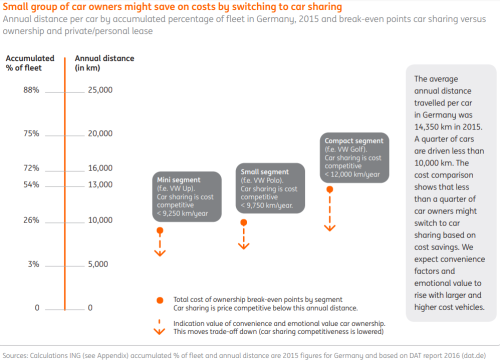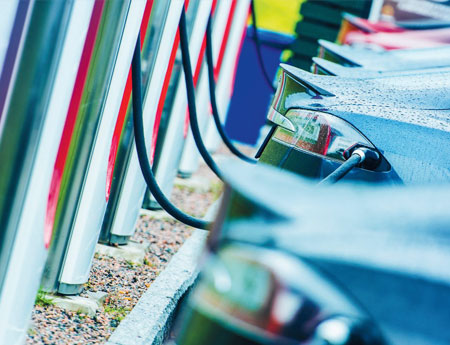Car sharing on the rise
4 October 2018
A car is more than just a way to get from point A to B. Two out of three Europeans attach an emotional value to their cars. Yet most are parked up for to 95% of the time. Why not share your car and earn some extra money? It’s a win-win!

ING expects that in 2035, average sales of ‘shared cars’ will be 1.5 million units or one in every nine cars sold.
Car sharing refers to a service where people pay to use a car for a short period of time (hours rather than days). Payment is based on the time it is used (per minute or per hour) or the distance driven (per kilometre). ING studied the potential of car sharing in Europe, asking close to 13,000 consumers in 13 different countries for their views.
The survey found that 30% of Europeans with a driving license showed interest in using car sharing services, while more than 60% would be prepared to share their car for money.
ING expects technology and smart platforms will propel car sharing out of its current niche and put Europe on the road to 7.5 million shared cars by 2035.

Peer-to-peer sharing
While there are already services providing shared cars (e.g. Car2Go), the true potential of car sharing lies in developing platforms where people can share their own cars with others.
Car sharing platforms face strong competition from ride hailing platforms like Uber and Lyft. However, they can also learn from them, for example in how to develop pricing mechanisms to manage supply and demand. Car makers themselves could play a role by developing their own peer-to-peer platforms on which their customers can share their cars.
Autonomous cars will boost sharing
Self-driving cars will also increase car sharing. We expect level 4 cars – which are autonomous within a dedicated area – will offer users a better experience and make pick-up and drop-off easier. In addition, increased connectivity of cars will increase trust and make people feel more comfortable about sharing vehicles as it will enable remote access and makes it possible to monitor driver behaviour.
Our predictions
ING expects that in 2035, average sales of ‘shared cars’ will be 1.5 million units or one in every nine cars sold. Sales of new ‘shared cars’ will be driven by higher demand for car sharing and more use of shared cars. At the same time, sales of new passenger cars for own use only will reduce by one million units a year.
Read ING’s full car sharing report on think.ing.com


